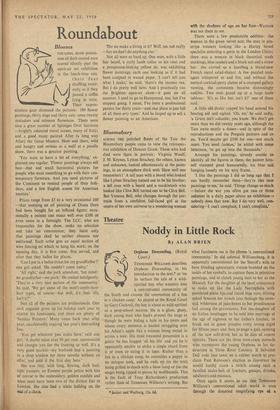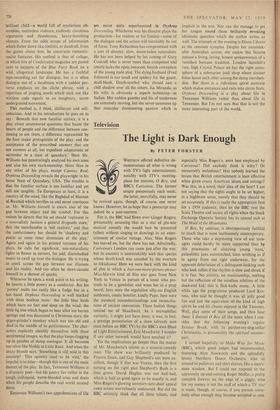Theatre
Noddy in Little Rock
By ALAN BRIEN TENNESSEE WILLIAMS describes Orpheus Descending, in his introduction to the text,* as 'on its surface the tale of a wild- spirited boy who wanders into a conventional community of the South and creates the commotion of a fox in a chicken coop.' As played at the Royal Court by Gary Cockrell, the boy is about as wild-spirited as a prep-school matron. He is a glum, 'gluey, dark young man who backs around the stage as though he were hiding a hole in his pants and whose every sentence is hauled struggling over his Adam's apple like a salmon being reeled in across a weir. His most treasured possession is a guitar he has hugged 'all his life' and yet he is apparently unable to strike a single chord from it or even to string it in tune. Rather than a fox in a chicken coop, he resembles a puppy in an octopus tank, and he ends up (in the text) being grilled to death with a blow lamp or (on the stage) being ripped to pieces by wolfhounds. This is the fault of Tony Richardson's production rather than of Tennessee Williams's writing. But *Seeker and Warburg, 12s. 6d. what fascinates me is the phrase 'a conventional community.' In old colonial Williamsburg, it is apparently conventional for the Sheriff's wife to have blinding apocalyptic visions branded on the inside of her eyeballs, to capture them in primitive paintings, and to clutch young men to her as the Messiah. For the daughter of the local aristocracy to make up like the Lady Necrophilia with powdered white lips and tinted blue eyes, driving naked beneath her trench coat through the neon- sick wilderness of juke-boxes to her promiscuous bed among the gravestones. For the. daughter of an Italian bootlegger to be sold into marriage at the age of eighteen to her father's lyncher, to break out in goose pimples every loving night for fifteen years and then to stage a gala opening of the new soft-drink bar as he ,dies of cancer upstairs. These are the three man-crazy mzenads who manoeuvre the young Orpheus to his de- struction in Three River Country. If Salvador Dali rode into town on a rubber watch to pro- claim Paul Robeson's election as Governor he would hardly cause a twitch among such a ravelled snake-ball of lynchers, gossips, drunks, adulterers and maniacs.
Once again it seems to me that Tennessee Williams's conventional adult 'world is seen through the distorted magnifying eye pi a brilliant child—a world full of mysterious ob- scenities, motiveless violence, endlessly circuitous arguments and thunderous, heavy-breathing silences. From the odds scraps of information which flutter down like donfetti, or dandruff, from the giants above him, he constructs romantic- realist fantasies. His method is that of collage, in which bits of Confidential magazine are pasted . next to snippets of the Blue Fairy Book on a wild, allegorical .landscape. He has a faithful tape-recording ear for dialogue, but it is often dialogue out of a daydream with a sudden per- verse emphasis on the cliche phrase, with a repetition of jingling _words which stick out like wireless code signals to an imaginary, secret underground movement.
This method is, I think, deliberate and self- conscious. And in his introduction he goes on to say : 'Beneath that now familiar surface, it is a play about unanswered questions that haunt the hearts of people and the difference between con- tinuing to ask them, a difference represented by the four major protagonists of the play, and the acceptance of the prescribed answers that are not answers at all, but expedient adaptations or surrender to a state of quandary.' Here Mr. Williams has penetratingly analysed his own aims and also his own marksmanship. More than in any other of his plays, except Camino Real, Orpheus Descending reveals the playwright in his home State of Quandary, USA. The trouble is that the familiar surface is too familiar and yet still not tangible. To Europeans at least, it is a country of the mind, like the Baghdad of Haroun al Raschid which terrifies us and never convinces us. Mr. Williams himself is aware also of the gap between object and the symbol. For this reason he directs that his set should 'represent in a nonrealistic fashion a general drygoods store,' that the merchandise is 'not realistic,' and that the confectionery bar should be 'shadowy and poetic as some inner dimension of the play.' Again and again in his printed versions of his plays, he calls for significant, non-naturalistic lights to flower in corners, for odd, disembodied music to swell up over the dialogue. He is trying to spark across the gap between our illusions and his reality. And too often he short-circuits himself in a shower of sparks.
Whenever he spots a weak point in his writing, he inserts a little poetry as a conductor. But his 'poetry' melts too easily like a fudge bar in a hot hand. Orpheus Descending is well stocked with these bonbon mots: the little blue birds which have no feet and sleep on the wind; the little fig tree which began to bear after ten barren springs and was decorated in Christmas stars; the organ-grinder's monkey which was too old and died in the middle of its performance. The char- acters explicitly identify themselves with these sentimental images, so that the play keeps clogging up in patches of damp meringue. It all becomes too often like Noddy in Little Rock. And when the crazy blonde says, 'Something is still wild in this country! This cpuntry used to 14 wild,' the impulse is to titter—though this is one of the main themes of the play. In fact, Tennessee Williams is a dramatic poet—but his poetry lies rather in the tough, colloquial, warm-blooded arias and duets when his people describe the real world around them.
Tennessee Williams's two apprehensions of life are never quite superimposed in Orpheus Descending. Whichever way his director plays the production—for realism or for fantasy—some of the dialogue and the action will inevitably be out of focus. Tony Richardson has compromised with a sort of dreamy, slow, doom-laden naturalism. He has not been helped by his casting of Gary Cockrell who is never more than competent and utterly lacks the open, innocent, boyish corruption of the young male stud. The dying husband (Fred Johnson) is too small and spidery for the gaunt, skull-blank, Death-symbol who should cast a chill shadow over all, the others. lsa Miranda, as his wife, is obviously a superb techniciap—in Italian. Her sudden gaieties and fits of tenderness are extremely moving, but she never summons up that muscular domineering passion which is implicit in the text. Nor can she manage to get her tongue round those brilliantly revealing idiomatic speeches which the author writes so well. The triumph of the evening is Diane Client() as the constant nympho. Despite her unmistak- able Australian accent, she' makes this bizarre outcast a living, loving, honest spokeswoman of a vanished humane tradition. Loudon Sainthill's vast, high Crystal Palace set has the right atmo- sphere of a submarine junk shop where sinister fishes haunt each other among the damp merchan- dise. But there is a ridiculous spiral staircase which makes entrances and exits into circus feats. Orpheus Descending is a play about life in Tennessee Williams rather than about life in Tennessee. But I'm not sure that that is not the more interesting part of the world.







































 Previous page
Previous page